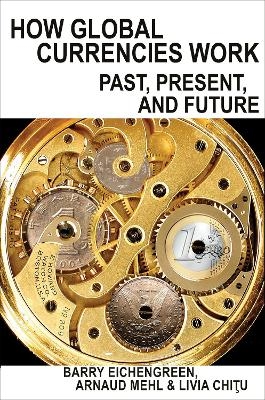
How Global Currencies Work
Princeton University Press (Verlag)
978-0-691-17700-7 (ISBN)
They show that multiple international and reserve currencies have in fact coexisted in the pastupending the traditional view of the British pound's dominance prior to 1945 and the U.S. dollar's dominance more recently. Looking forward, the book tackles the implications of this new framework for major questions facing the future of the international monetary system, from whether the euro and the Chinese yuan might address their respective challenges and perhaps rival the dollar, to how increased currency competition might affect global financial stability.
Barry Eichengreen is the George C. Pardee and Helen N. Pardee Professor of Economics and Political Science at the University of California, Berkeley. His books include Hall of Mirrors, Exorbitant Privilege, Globalizing Capital, and The European Economy since 1945. Arnaud Mehl is principal economist at the European Central Bank. Livia Chi?u is an economist at the European Central Bank.
List of Tables vii
List of Figures ix
Acknowledgments xiii
1 Introduction 1
2 The Origins of Foreign Balances 16
3 From Jekyll Island to Genoa 30
4 Reserve Currencies in the 1920s and 1930s 42
5 The Role of Currencies in Financing International Trade 58
6 Evidence from International Bond Markets 84
7 Reserve Currency Competition in the Second Half of the Twentieth Century 116
8 The Retreat of Sterling 145
9 The Rise and Fall of the Yen 158
10 The Euro as Second in Command 170
11 Prospects for the Renminbi 181
12 Conclusion 195
Notes 201
References 227
Index 245
| Erscheinungsdatum | 03.11.2017 |
|---|---|
| Zusatzinfo | 38 line illus. 18 tables. |
| Verlagsort | New Jersey |
| Sprache | englisch |
| Maße | 152 x 235 mm |
| Gewicht | 567 g |
| Themenwelt | Geschichte ► Teilgebiete der Geschichte ► Wirtschaftsgeschichte |
| Sozialwissenschaften ► Politik / Verwaltung ► Europäische / Internationale Politik | |
| Wirtschaft ► Volkswirtschaftslehre ► Finanzwissenschaft | |
| Wirtschaft ► Volkswirtschaftslehre ► Makroökonomie | |
| ISBN-10 | 0-691-17700-7 / 0691177007 |
| ISBN-13 | 978-0-691-17700-7 / 9780691177007 |
| Zustand | Neuware |
| Haben Sie eine Frage zum Produkt? |
aus dem Bereich


